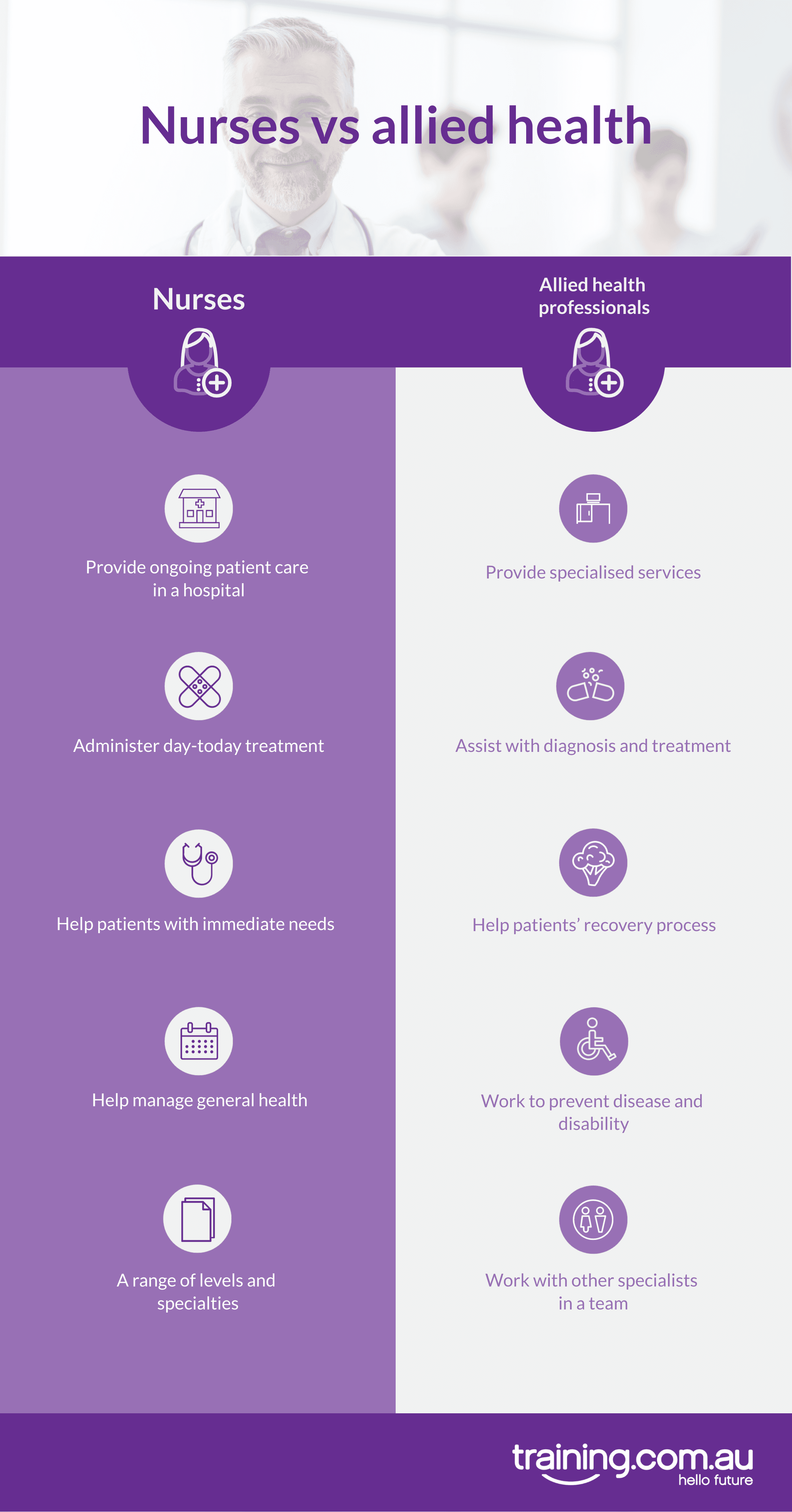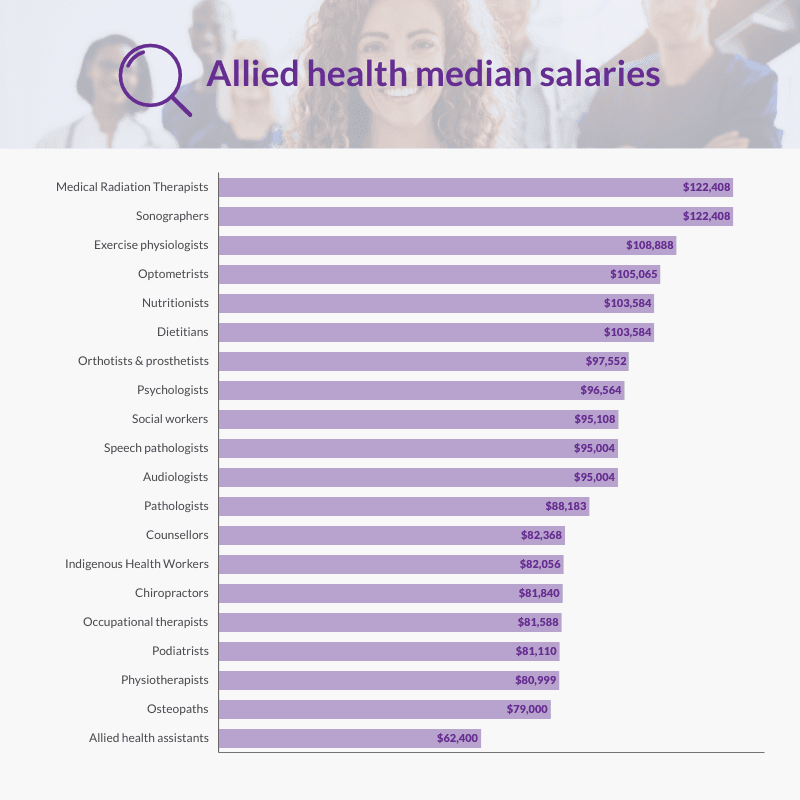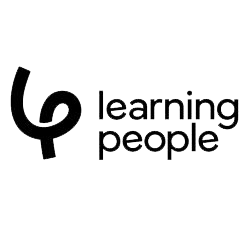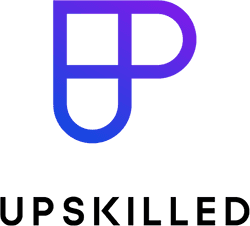In this post
- What is allied health?
- What’s a career in allied health like?
- Who are allied health professionals in Australia?
- Salary expectations for allied health jobs
- What are the highest paying allied health careers?
- What allied health careers are in demand?
- Types of allied health jobs in Australia
- Allied health degrees and qualifications
- Is a career in allied health right for you?
- Browse Allied Health Results
Considering a Career in Allied Health But Don’t Know Where to Start?

In this post Show
- What is allied health?
- What’s a career in allied health like?
- Who are allied health professionals in Australia?
- Salary expectations for allied health jobs
- What are the highest paying allied health careers?
- What allied health careers are in demand?
- Types of allied health jobs in Australia
- Allied health degrees and qualifications
- Is a career in allied health right for you?
- Browse Allied Health Results
If you want to make a difference in peoples’ lives, a career in allied health is an excellent option. This rewarding career path enables you to work in the healthcare community, meet people from all walks of life, and help them along their healing journey.
Apart from being personally rewarding, these professions come with great pay, job security, and respect within the community — all with less demanding and rigorous training than you’d need to enter the medical profession.
What is allied health?
‘Allied health’ is an umbrella term covering the broad range of non-medical health professions that aren’t medical doctors, nurses, or dentists. Allied health professionals (AHPs) are healthcare practitioners, such as physiotherapists or audiologists, who provide health services. They often work as part of a multidisciplinary healthcare team.
Allied health professionals are an integral part of our health system in Australia. Demand for skilled, dedicated professionals is booming across the health, aged care, mental health, and disability sectors. They assist patients in recovering from illness or injury, managing chronic illnesses, and maintaining their overall health and well-being.
Because of this holistic, long-term focus, they can help avoid the need for medical intervention altogether. In turn, this lifts some of the strain from the medical system.
What’s a career in allied health like?
Careers in allied health can be extremely rewarding in several ways.
Imagine seeing a patient who has suffered a stroke get back on their feet, and knowing you helped them through that journey. Or helping a young child go through rehabilitation until they can finally move around and do what they want to do. If you’re drawn to helping people, the look on their parents’ faces will give you a feeling that money can’t buy.
Meaningful
Practitioners often say that helping people to heal gives them great job satisfaction. You’ll be challenged by working with different patients of all ages, abilities, and backgrounds, who will often come in feeling nervous until you put them at ease.
Well-respected and well-paid
Using your expertise, you’ll have the authority to plan patients’ care pathways without oversight from others. You’ll make good use of your skills and knowledge to have a big impact on people’s lives. And you’ll be rewarded financially for your expertise and responsibility.
Connected
Not only will your job center around helping people, but you’ll be well-supported by your colleagues — who are likely to be caring, compassionate people themselves.
Flexible
Allied health jobs are more flexible than many other professions. And compared to other jobs in the healthcare field, the training is much faster. While many medical jobs require a postgraduate degree, plus years of vocational training, you can get into many allied health jobs with a three or four-year bachelor’s degree. Allied health assistant jobs are a great way to get started in the industry and only require a Certificate III.
Rugby led him to a career in physiotherapy
A shattered career in rugby, which ended due to a neck injury acquired on the field, led me to a fair bit of rehab myself which inspired me to attend the University of Sydney to train as a physiotherapist. With a Bachelor of Applied Science (Physio) from the University of Sydney, I started working in clinics before opening my own at the age of 24.
What he finds most rewarding
I am passionate about advocating for a higher quality of patient-centered allied healthcare both within my own franchise and mobile business and in the wider industry. My aim is to improve the lives of a million Australians a year through quality and accessible health care.
What he wishes he'd known before starting in this field
The sciences are very rigid fields of study and employment, with processes and treatment plans that you have to stick to. To keep engaged, I suggest finding other ways to express creativity and innovation, such as finding a project which fuels your passions like manual handling or mindfulness.
Who are allied health professionals in Australia?
There are countless career opportunities in allied health. Depending on the field you choose, you could end up working in all kinds of care settings: a hospital or private clinic, in a rehabilitation center, aged care facility, community health clinics, or even at a university or school.
So, what jobs are considered allied health in Australia?
- Social workers
- Physiotherapists
- Counsellors
- Psychologists
- Occupational therapists
- Speech pathologists
- Dental assistants
- Optometrists
- Sonographers (Ultrasound)
- Podiatrists
- Chiropractors
- Pharmacy assistants
- Dietitians
- Exercise physiologists
- Pathologists
- Audiologists
- Medical radiation therapists (X-rays)
- Osteopaths
- Indigenous/Aboriginal and Torres Strait Islander health workers
- Music therapists
- Nutritionists
- Orthotists & prosthetists
- Allied health assistants
Sources: Department of Health and the AHPA
What is the difference between the medical and allied health professions?
Allied health is different from traditional medicine. To start with, roles in allied health do not require a medical degree (with the exception of pathologists).
Medical professionals, such as doctors, nurses, dentists, and pharmacists, draw on their knowledge of health science to diagnose and treat symptoms. Roles in the medical field usually require extensive training. For example, surgeons and psychiatrists have to train for 13-15 years.
Though they often work with doctors, allied health professionals are independent practitioners who can make their own decisions without supervision. They take an evidence-based approach, using an internationally recognised body of knowledge. Some have postgraduate degrees, while others may have Certificates, Diplomas or Bachelors.
The national voice for allied health professionals, Allied Health Professions Australia, defines allied health professions as:
- Healthcare professionals
- Not in the medical, nursing, or dentistry professions
- Direct patient-care roles
- Having a direct scope of practice
- Having a national professional organisation, code of ethics, and membership requirements
- Having national standards of competence and assessment
- Having regulatory mechanisms
The AHPA also defines allied health professionals as being university-trained. They don’t, however, include roles such as Indigenous health worker (who need to hold a Certificate IV) in their list of allied health professions, whereas other government departments do.
What is the difference between the medical and allied health professions?
Nurses are part of the medical profession. By definition, they are not allied health professionals. The main differences are:

Nurses:
- Provide ongoing patient care in a hospital
- Administer day-to-day treatment
- Help patients with immediate needs
- Help manage general health
- Have a range of levels and specialties
Allied health professionals:
- Provide specialised services
- Assist with diagnosis and treatment
- Help patients’ recovery process
- Work to prevent disease and disability
- Work with other specialists in a team
Salary expectations for allied health jobs
Salaries can vary significantly in Allied Health, particularly depending on what field you choose and where you are employed. Here are the average salary ranges for allied health jobs in Australia, in order of highest median salary to lowest:
Occupation | Low | Median | High | Qualification needed |
|---|---|---|---|---|
Medical radiation therapists | $64,356 | $122,408 | $146,358 | Bachelor of Applied Science (Medical Radiations) |
Sonographers | $111,794 | $122,408 | $156,000 | Graduate Diploma in Medical Ultrasound / Diploma of Diagnostic Ultrasound / Masters of Medical Imaging |
Exercise physiologists | $70,035 | $108,888 | $151,250 | Bachelor of Clinic Exercise Physiology / Master of Applied Sports Science / Graduate Certificate of Strength and Conditioning |
Optometrists | $85,450 | $105,065 | $151,000 | Postgraduate qualification in Optometry |
Nutritionists | $76,414 | $103,584 | $111,774 | Diploma of Nutrition / Bachelor of Science majoring in Nutrition |
Dietitians | $76,414 | $103,584 | $111,774 | Master of Dietetics |
Orthotists & prosthetists | $76,148 | $97,552 | $113,031 | Bachelor of Applied Science or Health Science majoring in prosthetics or orthotics |
Psychologists | $84,389 | $96,564 | $130,198 | Multiple pathways available, 6 years minimum study |
Social workers | $70,177 | $95,108 | $116,317 | Masters in Social Work |
Speech pathologists | $72,397 | $95,004 | $117,345 | Bachelor of Speech Pathology / Master of Speech Pathology |
Audiologists | $57,935 | $95,004 | $126,750 | Master of Clinical Audiology |
Pathologists | $72,444 | $88,183 | $120,129 | A medical qualification, plus further training with the Royal College of Pathologists of Australasia |
Counsellors | $69,967 | $82,368 | $117,000 | |
Indigenous health workers | $64,428 | $82,056 | $84,859 | Certificate IV in Aboriginal and Torres Strait Islander Primary Health Care |
Chiropractors | – | $81,840 | – | Master of Clinic Chiropractic |
Occupational therapists | $70,000 | $81,588 | $104,146 | Bachelor of Occupational Therapy |
Podiatrists | $72,623 | $81,110 | $126,750 | Bachelor of Podiatry |
Physiotherapists | $70,000 | $80,999 | $120,383 | Bachelor of Physiotherapy / Bachelor of Applied Science (Physiotherapy) / Master of Physiotherapy |
Osteopaths | $70,000 | $79,000 | $103,350 | Master of Osteopathic Medicine |
Allied health assistants | $52,595 | $62,400 | $70,760 |
Data sources:
Median from JobOutlook.gov, balanced against data from job sites Indeed and au.talent.com. Salary ranges from au.talent.com.
What are the highest paying allied health careers?
Sonographers, medical radiation therapists, exercise physiologists, optometrists, dietitians, and nutritionists earn the highest median salaries of the allied health jobs, all bringing in a healthy average of six figures.
Sonographers, exercise physiologists, and optometrists have the highest earning potential, with the high end of their salary range reaching past $150,000.

What allied health careers are in demand?
These allied health careers are growing very strongly, according to the Australian government’s employment projection data. They are ordered in size, starting from the largest occupational group.
Social workers
40,300 workers (Very strong growth)
Physiotherapists
31,900 workers (Very strong growth)
Counsellors
26,800 workers (Very strong growth)
Occupational therapists
16,300 workers (Very strong growth)
Hayley is at the cutting edge of gut microbiome science
Hayley Parcell
Head of Healthcare Operations & Development at Microba
An interest in food as medicine led me to nutrition
[I found my way to allied health through] an interest in food as medicine and observing how disease and illness can be greatly impacted by someone’s nutritional status. I’m passionate about communicating the fact that being well-nourished is a key component to good health.
What I find most rewarding
At Microba, we are at the cutting edge of gut microbiome science and helping everyday Australians and healthcare professionals to understand more about the importance of our bacteria and how we fuel it. Being part of this fast-moving area of health is exciting and science is now proving that diet has a huge impact on the health of our individual gut microbiomes which is a contributor to our overall health. It is extremely rewarding to support healthcare practitioners and their patients to achieve better health via diet.
What I wish I'd known before I'd started in this field
The importance of making your own path in the industry. Qualifications in nutrition can take you down many paths however, self-motivation to seek the opportunities you want is essential.
Types of allied health jobs in Australia
While getting into allied health services can be an exciting career move, how can you decide which field is best for you — especially when you’ve got no experience?
This list of potential allied health positions will give you more of an idea of the areas open to you – and what each involves. Keep in mind that you can develop a career as any one of the below. On the other hand, you can be employed as a support worker or assistant to a qualified physician.
Occupational Therapy
Occupational therapists assist children and adults with illnesses or disabilities to function in their daily lives and activities. They can help with everyday duties like eating and dressing, or with other things like exercise and recreational activities. Occupational therapists are in high demand, making career prospects strong.
Audiologist
Audiologists help people with hearing disabilities. They conduct hearing tests, determine causes of hearing or balance loss and provide solutions. They can work in hospitals and clinics, and be involved in research and development, too.
Podiatrist
Thinking you’d like to know more about feet, legs, toes, and how they work (or don’t work)? Podiatrists treat various foot conditions, from skin or nail conditions to muscular conditions.
Nutritionist or Dietitian
Nutritionists and dietitians work with patients to advise them on good health and/or manage illnesses such as cancer, diabetes, obesity, or an eating disorder. In Australia, dietitians require additional dietetic qualifications and study and are qualified to work in a medical capacity.
Speech Pathologist
Speech pathologists also assist children and adults in overcoming speech and swallowing difficulties. They can help treat disorders such as autism or stuttering or work to rehabilitate patients after strokes.
Orthotist
An Orthotist is responsible for orthotics or prosthetics, otherwise commonly known as artificial limbs. Orthotists work with a range of people in fitting, managing and getting used to prosthetics.
Allied health degrees and qualifications
Certificate
If you’re keen to get into Allied Health, it can be a good idea, to begin with, a Certificate III qualification in your chosen field. Throughout the certificate course, you’ll learn about the basics of the body (anatomy, physiology), become familiar with medical terminology, and learn how to provide care for patients in your area.
Some courses will also teach you how to conduct health interventions, create programs, and effectively communicate with the people you’ll be looking after, even if they can’t communicate fully with you. Many certificates will also involve a practical or work placement to help you build your skills.
If you graduate with a Certificate in Allied Health, you’ll be qualified to start working as an allied health assistant. This is a fantastic career in and of itself, or it can be the perfect starting point for entering one of the professions with a better understanding of the specialisations.
Diploma
While there’s no specific diploma in allied health, some non-clinical nutritionists hold a Diploma of Nutrition. Find out more about studying nutrition and entering this career path.
Bachelor degree
Most of the allied professions require a bachelor’s degree. Some require a Master’s or a further postgraduate qualification. The following professions require a bachelor-level qualification (and usually an additional form of accreditation or membership) to enter:
- Speech pathologists: Bachelor of Speech Pathology / Master of Speech Pathology (if you’ve come from a health science degree)
- Podiatrists: Bachelor of Podiatry
- Physiotherapists: Bachelor of Physiotherapy / Bachelor of Applied Science (Physiotherapy) / Master of Physiotherapy
- Occupational therapists: Bachelor of Occupational Therapy
- Counsellors: Bachelor of Counselling
- Exercise physiologists: Bachelor of Clinic Exercise Physiology / Master of Applied Sports Science / Graduate Certificate of Strength and Conditioning
- Orthotists & prosthetists: Bachelor of Applied Science or Health Science (majoring in prosthetics or orthotics)
- Medical radiation therapists: Bachelor of Applied Science (Medical Radiations)
Can you be a nurse with an allied health degree?
The short answer is no, you can’t be a nurse with an allied health degree. An allied health degree will only qualify you to work in the field of your study; nursing is a distinct field, with its own qualifications. Discover the difference between Enrolled Nurses and Registered Nurses.
To become an Enrolled Nurse, you’ll need a Diploma of Nursing qualification.
To become a Registered Nurse, you will need a Bachelor of Nursing.
And in both, you’ll also need to register with the Australian Health Practitioner Agency (AHPRA).
You could, however, get two qualifications: one in allied health, and one in nursing. That way, you could be both a nurse and allied health professional.
Christine shifted from nursing to nutrition
Christine Stewart
Nutritionist and Clinical Application Specialist at Microba
Interest in chronic disease led her to a career in allied health
During the 15 years I worked as a Registered Nurse I observed a rise in chronic diseases such as Type 2 Diabetes, Cardiovascular Disease, and Stroke, etc. I also noticed these conditions were being diagnosed in younger and younger patients.
I began to look into the developmental origins of these conditions and found that diet and lifestyle were major risk factors for the development of these. I knew I wanted to learn more about how to prevent the onset of chronic disease so I studied a Masters in Human Nutrition at Deakin University and found what I was truly passionate about – teaching people how to reconnect with nutritious food and ways to incorporate more into their lives.
My research beyond University led me to the role the microbiome might play in chronic disease. Although research in this area is still emerging, it is showing some strong links with metabolic conditions. I love working in the public health nutrition and microbiome space and feel one day my two passions will meet.
What she finds most rewarding
I am passionate about understanding the current level of evidence and then translating this into language that everyone can understand. I also enjoy seeing transformations in patients when they begin to make shifts in their health through modifying their diet and lifestyle.
What she wishes she'd known before starting
Before I embarked on my path to nutrition I wish I knew more about all the different roles a nutritionist could work in. I previously ‘assumed’ that it was private practice or public health work post-graduation, however, I now know there are many more opportunities such as in nutrition research, communications, food industry, ambassador work, culinary nutrition, sales and so much more.
Is a career in allied health right for you?
People who work in Allied Health tend to be caring and compassionate people. After all, they’ve chosen to spend their working lives helping others.
The personal qualities that will set you up for success in this career are:
Adaptable
You’ll need this to cope with the pressures of the job and having a fast-paced schedule.
Friendly
People will want to talk to you during appointments, so it pays to enjoy a chat and make them feel comfortable.
Supportive
You’ll be helping people through some tough times, and showing empathy goes a long way.
The skills you’ll need to do your job well include:
Communication skills
Active listening and speaking are key to understanding and educating your patients.
Attention to detail
You’re responsible for people’s quality of life, so your ability to be accurate in your work is of utmost importance.
Organisation
You’ll need to manage your own schedule throughout the day, and make sure the administrative side of things runs smoothly.
Glenn loves helping people achieve their goals
Glenn Stevens
Chiropractor and owner of The Functional Movement club
Sports led me to a career in allied health
I was always a sporty kid growing up and was fascinated with how the body moved and how you were only limited by your ability to train the body. I played state AFL and although I trained 2x/ day, 7 days a week there were still kids better than me at state carnivals.
This is where I learned about how amazing the body was in its ability to recover from injury and thought if it was capable of recovering from injury this way, how could you translate that into improving performance
What I find most rewarding
Helping people have a positive experience with and achieve goals that they didn’t think were achievable. We help them perform magic every day.
What I wish I'd known before I'd started in this field
Being in the health sector is more about connecting with the person than it is the skills you learn at uni. Uni trains you not to kill someone and opens up the doorway to lifelong learning to become a good practitioner.
A career in allied health can be enriching no matter what field you choose. All you need is a desire to care for others and a willingness to learn as much as you can!
Browse Allied Health Results
AWS Certified SysOps Administrator – Associate
Why choose the AWS Certified SysOps Administrator – Associate? The certificate validates your skills in deploying, managing, and operating scalable and fault tolerant systems on AWS. You’ll explore data flow control, selecting appropriate AWS ser...
AWS Certified Solutions Architect Professional
Why choose the AWS Certified Solutions Architect – Professional? Going beyond the associate level, the AWS Certified Solutions Architect Professional certification validates advanced technical skills for planning and delivering scalable, highly a...
AWS Certified Solutions Architect – Associate
Why choose the AWS Solutions Architect Associate? Businesses are increasingly relying on cloud solutions, driving high demand for certified professionals. The AWS Solutions Architect Associate certification validates your skills in designing and deploy...
AWS Certified Developer – Associate
Why choose the AWS Certified Developer – Associate? The AWS Certified Developer – Associate certification is perfect for people wanting hands-on experience developing and maintaining an AWS-based application. By completing this course, you...
Automated Testing with Selenium
Why choose Automated Testing with Selenium? Selenium allows developers and testers to automate the testing of web applications across different browsers and platforms. And allows you to create test scripts in different languages like Ruby, Java, PHP, P...
Application Developer to Blockchain Solutions Architect
Why choose the Application Developer to Blockchain Solutions Architect? Transitioning from an Application Developer to a Blockchain Solutions Architect is an exciting and rewarding career move as Blockchain is fast becoming the preferred global solutio...
APM Project Management Qualification
Why choose the APM Project Management Qualification? The prestigious PMQ certification validates your Project Management knowledge, allowing you to excel in diverse assignments, from individual to large-scale capital projects. The APM Project Managemen...
APM Project Fundamentals Qualification
Why choose the APM Project Fundamentals Qualification? In just 30 guided hours, you’ll gain a comprehensive understanding of Project Management language and its core principles, regardless of your prior experience. The APM Project Fundamentals co...
AgilePM® Practitioner
Why choose the APMG AgilePM Practitioner? The Agile Project Management Practitioner is a widely recognised qualification that takes only 20 hours to complete. It enhances your employability through advanced Project Management skill development. With ne...
AgilePM® Foundation
Why choose the AgilePM® Foundation? The Agile PM® Foundation course is a professional certification designed to elevate your ability to approach Project Management with agility and self-sufficiency. Agile projects are characterised by self-empowered te...
Agile Project Management
Why choose the Agile Project Management certification? More projects are run using Agile methodologies than any other recognised framework, with demand for Agile-trained professionals constantly increasing. The Agile PM® Foundation course is a professi...
Agile for Software Development
Why choose Agile for Software Development? Agile software development methodology focuses on flexibility, collaboration, and efficiency and allow teams to deliver quality products. In our Agile for Software Development course you’ll explore Agile...
Business Analysis Certified Professional
Australia is currently seeing a growing demand for business analysts. In fact, according to SEEK, job opportunities in the field are set to increase by 23.2% over the next five years. To help those looking to start a career in this field, Lumify Learn...
Professional Certification in User Interface Design PCUI
Elevate your career with our intensive 12-week Professional Certificate in UI Design. Dive into the world of user interface design and master the art of creating visually stunning and user-friendly digital products. This program is designed to equip yo...
Xero & MYOB Package
Upskill & gain workforce ready skill sets in Xero and MYOB software. The Basic Xero and MYOB Package for accountancy, bookkeeping and administration roles comprise the Certificate in Xero. If you want to learn the software quickly to help you get w...
Start Your Own Business with Xero
Get a head start on running your own business. Complete this course and you’ll be perfectly set up to launch your business. Combined with our excellent Certificate in Xero, you’ll learn the proven, practical skills to help you generate new clients, inc...
Reception & Office Support Certificate
In no time at all, you’ll be in charge of the office. Being ‘front of house’ plays such a pivotal role in any business. And that could be you after this comprehensive 10-week course. You’ll learn how to converse with clients and help with a...
Psychology, Youth Counselling, and Mental Health Bundle
Master the skills to transform people’s lives. Learn the theory behind the skills and techniques used to successfully help young people work through their problems and issues with counselling and mental health. This bundle includes the Advanced Certifi...
MYOB Advanced Certificate
Gain an advanced workforce-ready skillset in MYOB. It’s one of the most highly awarded MYOB courses that you could take. The Advanced Certificate in MYOB for accountancy, bookkeeping and administration roles is loaded with specially rated achievements....
Mental Health Certificate BPS216
Understand more about common mental health conditions and how to manage these conditions. This course helps you to understand the signs, symptoms and possible treatments of adult mental health problems. For the sufferer, managing mental health is far e...
Online courses also available
Latest Articles
How to Apply for Work Placement: Tips & Resources
Congratulations! You’re about to embark on an exciting journey where you will practise and develop t...
11 Hobbies That Can Make You Money: Use Your Passion for Profit
Hobbies often get a bad rap. They’re seen as just a way to kill time, a mindless escape from t...
Is The Job You Hate Killing You? Why You Need to Make a Change
Do you hate your job? Studies show that staying in a job you hate has negative health effects and ev...
Want to read more?
5 Truths About Being a Dog Groomer, Told by a Dog Groomer
Working with dogs every day can be an absolute dream for some animal lovers. But working as a dog gr...
Free in ’23: Government Funded Courses in Western Australia
More than $112 million has been invested into the new Western Australian government funding scheme F...
2 Jobs Where You Can Make a Positive Impact on Children and Youth
Learn about becoming a childcare worker or youth worker – jobs that help young people are cared for...








